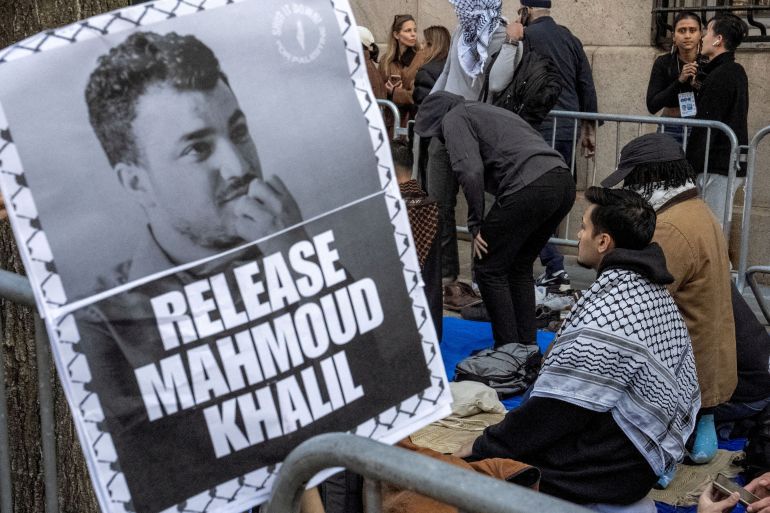Columbia protester Mahmoud Khalil challenges arrest in US immigration court
Khalil’s lawyer say ‘egregious government misconduct’ means the Trump administration’s deportation case should be thrown out.

By Joseph StepanskyPublished On 22 May 202522 May 2025
Mahmoud Khalil, a pro-Palestine protest leader targeted for deportation by the administration of US President Donald Trump, has sought to have the case against him thrown out in a consequential immigration hearing.
Khali’s lawyers were set to present evidence they say shows “egregious government misconduct” surrounding his March 8 arrest during Thursday’s hearing in Louisiana.
Recommended Stories
list of 3 itemsend of list
“When there are egregious violations, the case should be thrown out, and that’s what we’ve asked the immigration judge to do,” Mark Van Der Hout, a lawyer representing Khalil, told reporters the night before the proceedings. The violations in question, Van Der Hout said, include the lack of a warrant at the time of the arrest and claims that Khalil proved to be a flight risk.
The hearing could be the most consequential turn yet in a series of cases in which US students have challenged being targeted by the Trump administration for their pro-Palestine advocacy or statements. It comes after three other students – Rumeysa Ozturk, Mohsen Mahdawi, and Badar Khan Suri – successfully challenged their detentions.
Advertisement
Ozturk, Mahdawi, and Khan Suri have since been ordered released on bail as their parallel challenges in federal court and their deportation cases in immigration court proceed. Lawyers for the students say their rights, including freedom of speech, have been violated by the Trump administration.
Despite Khalil also challenging his arrest in a federal case in New Jersey, a judge there has yet to make a ruling on whether he should be released. He has remained in detention in Louisiana.
Khalil’s lawyers have accused the Trump administration of trying to slow roll his federal challenge to his arrest and detention, while fast-tracking the immigration proceedings. Judges in immigration courts, which fall under the executive branch, are typically viewed as less independent than life-tenured federal district judges.
“The bigger picture is that the government would like to slow down Mahmoud’s habeas corpus case in federal court before an independent judge who has life tenure,” Ramzi Kassem, a lawyer with the City University of New York’s Creating Law Enforcement Accountability and Responsibility (CLEAR) project, told reporters.
“And they’d like to accelerate as much as possible these immigration proceedings, as they have so far, in front of a government employee who is subject to government pressure,” he said.
Immigration Judge Jamee Comans had previously sided with US Secretary of State Marco Rubio’s claim that Khalil is deportable under an obscure provision of the Immigration and Nationality Act because his presence in the US poses “adverse foreign policy consequences”.
Advertisement
Rubio has broadly portrayed Khalil’s involvement in pro-Palestine protests at Columbia University as “anti-Semitic”, but has not provided any further evidence to the court supporting the claim.
Khalil and his legal team have firmly denied that his advocacy contained any anti-Jewish sentiment, and no evidence of such conduct has emerged.
Warrant-less arrest
Thursday’s hearing will not hinge on the government’s motivation for targeting Khalil, but will instead focus on procedural missteps by immigration agents.
Those agents had initially claimed that they had a warrant to detain Khalil when they confronted him in the lobby of his Manhattan apartment building. They later admitted they did not have a warrant, but arrested Khalil because they said his actions and statements indicated he was a flight risk.
Surveillance footage of the encounter contradicts that statement, Khalil’s lawyers maintain.
“We filed, over the last probably 48 hours, new evidence, including a video surveillance from Columbia that we got through a subpoena that clearly shows there was no attempt to flee whatsoever,” Van Der Hout said.
Lawyers for Khalil are also separately arguing that he is eligible for asylum. They say the unfounded claims made by the Trump administration that Khalil is a “Hamas supporter” would put him at risk if he were to be deported to his birthplace of Syria, or to Algeria, where he has citizenship.
Ahead of the hearing, officials from US Immigration and Customs Enforcement (ICE) denied a meeting between Khalil, his wife, Noor Abdalla, and their son, who was born while Khalil remained in detention.
Advertisement
A federal judge later ordered that Khalil must be allowed an in-person meeting with his wife.
